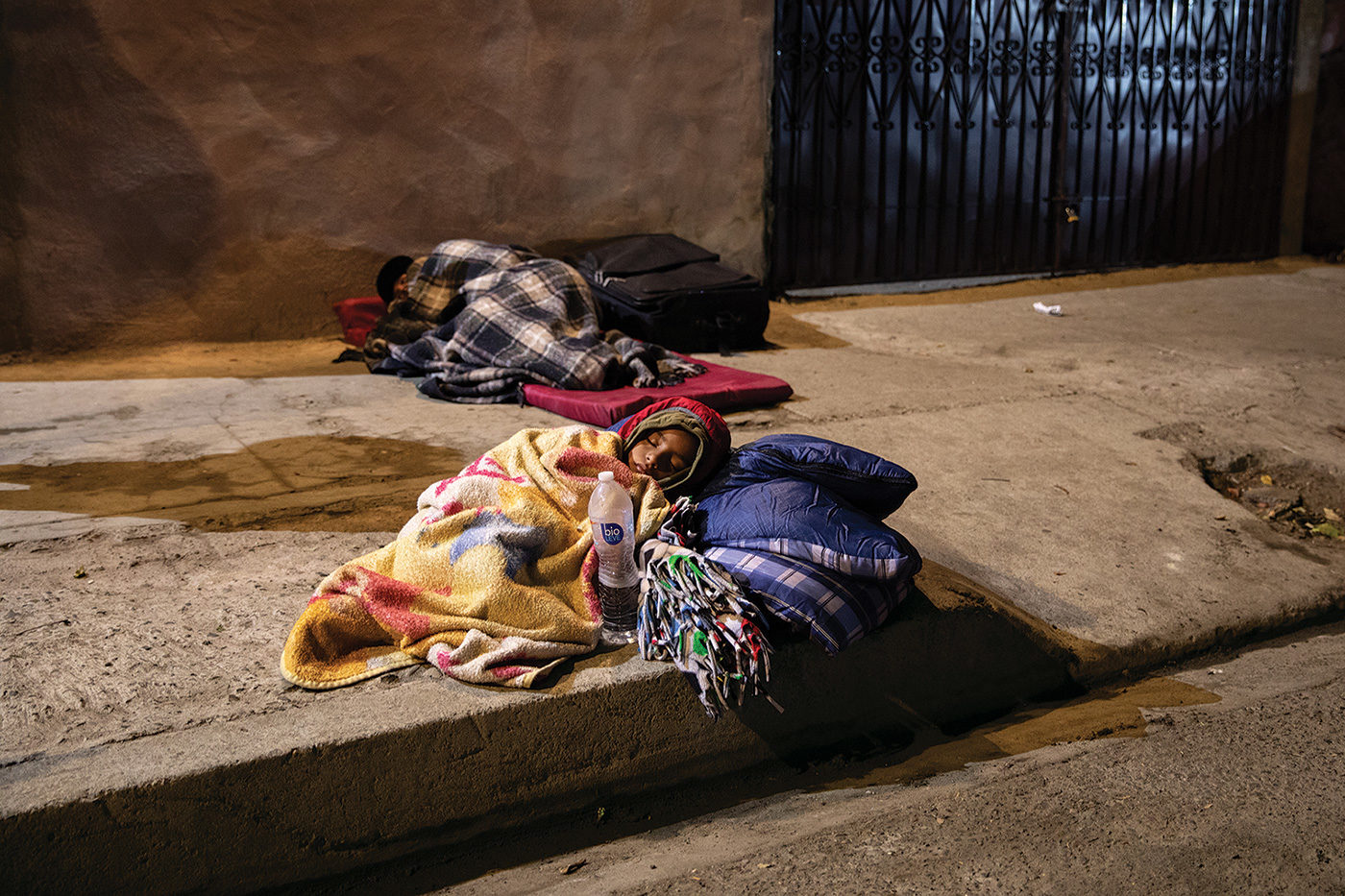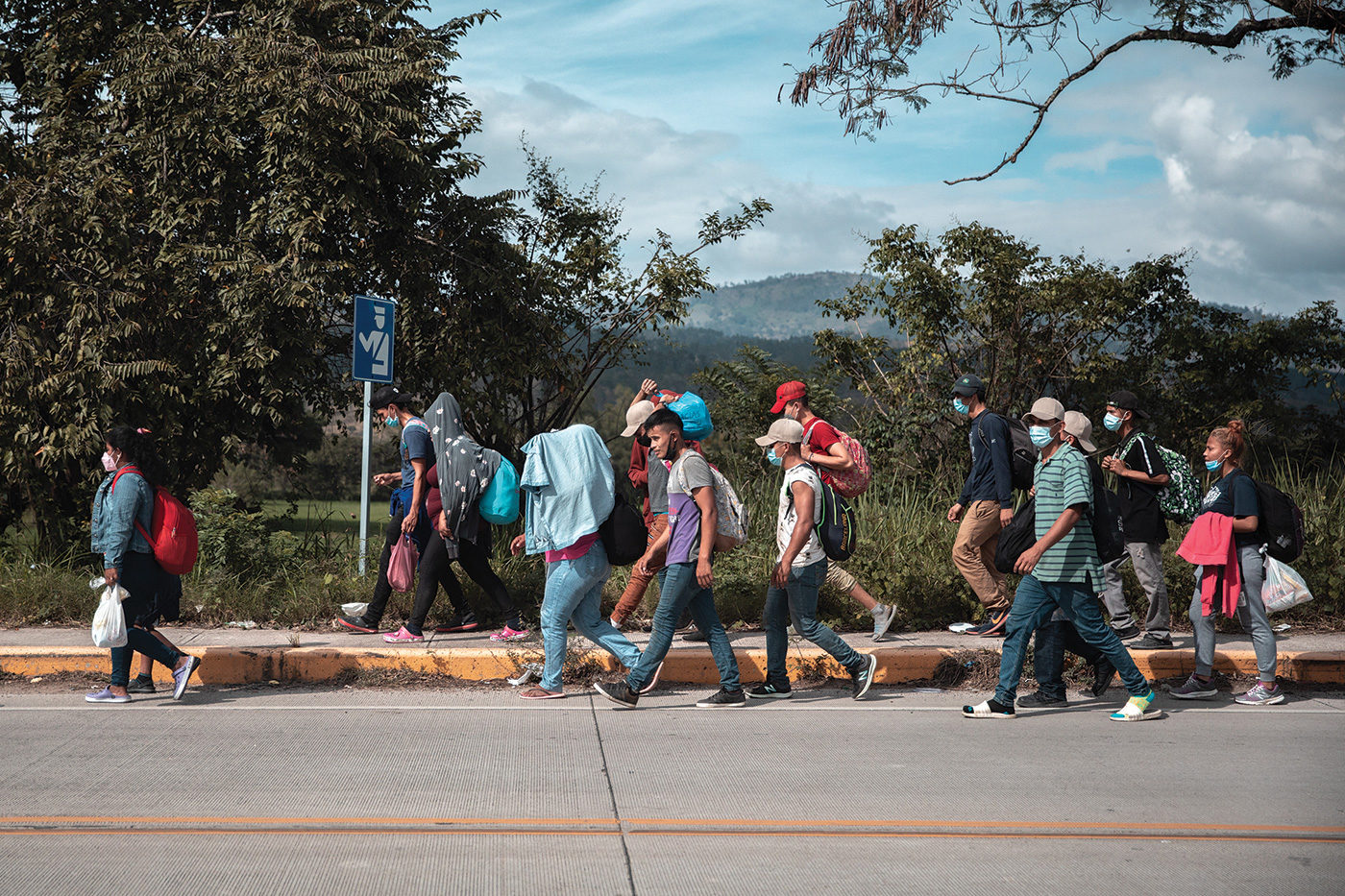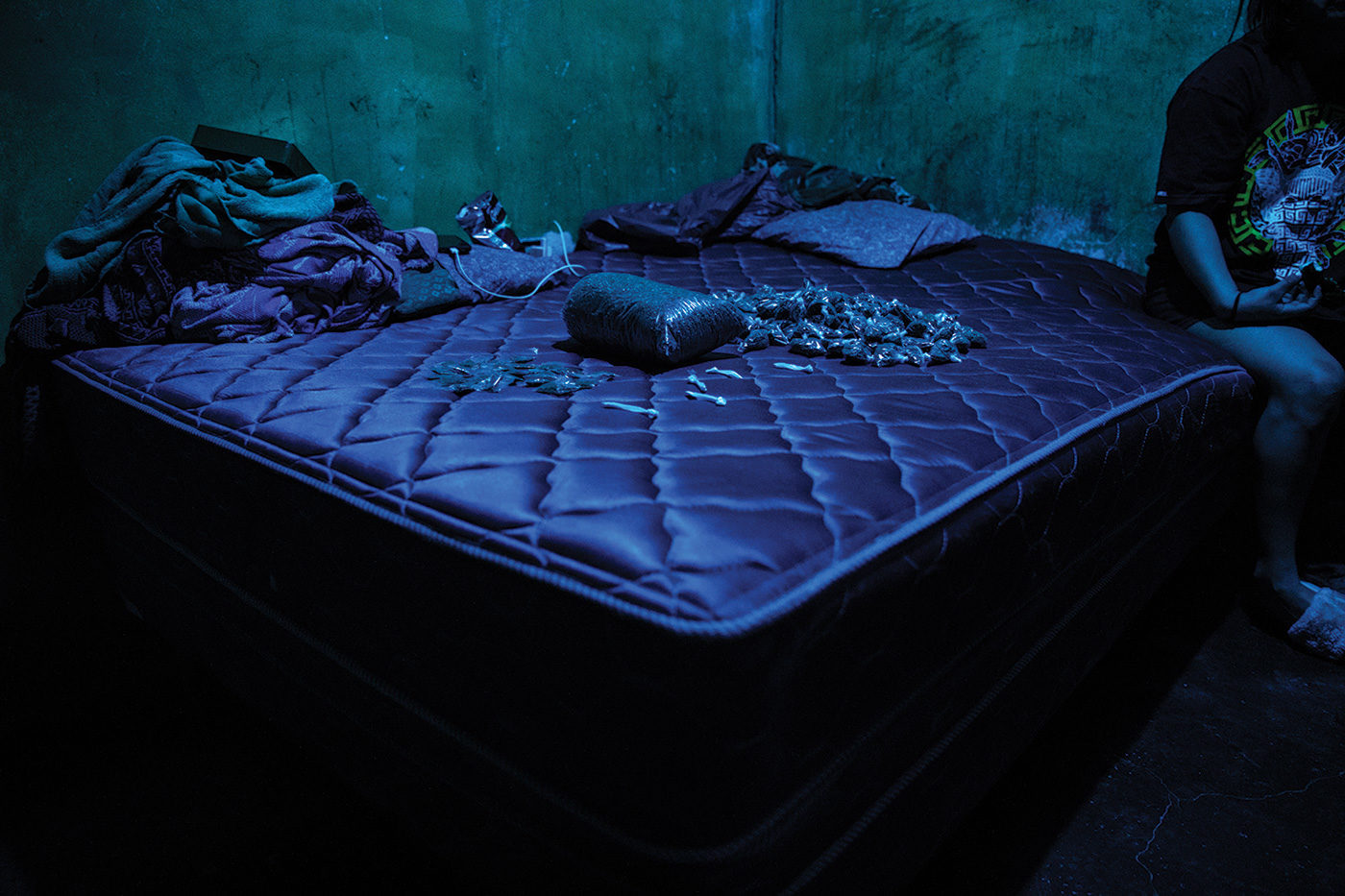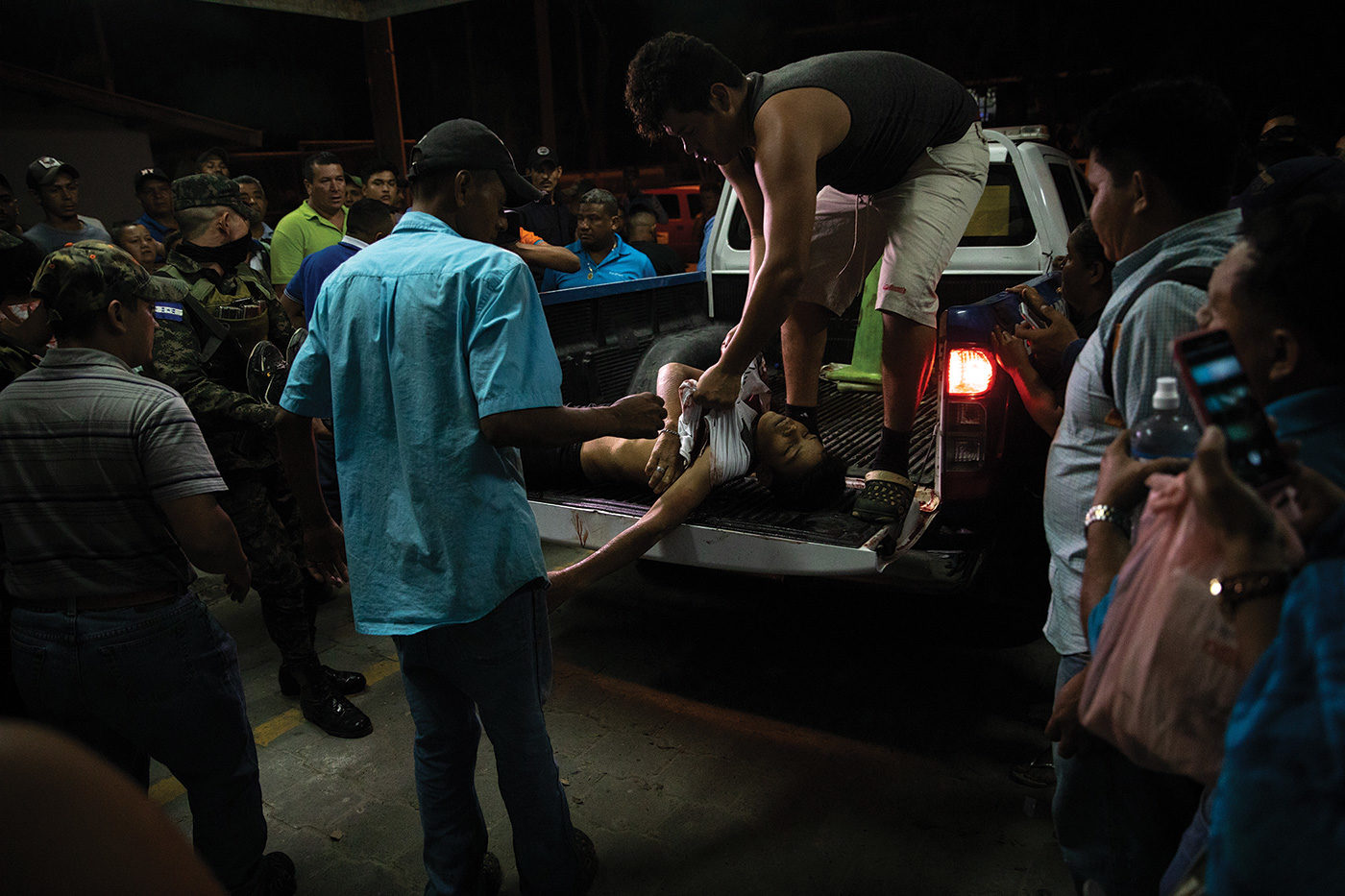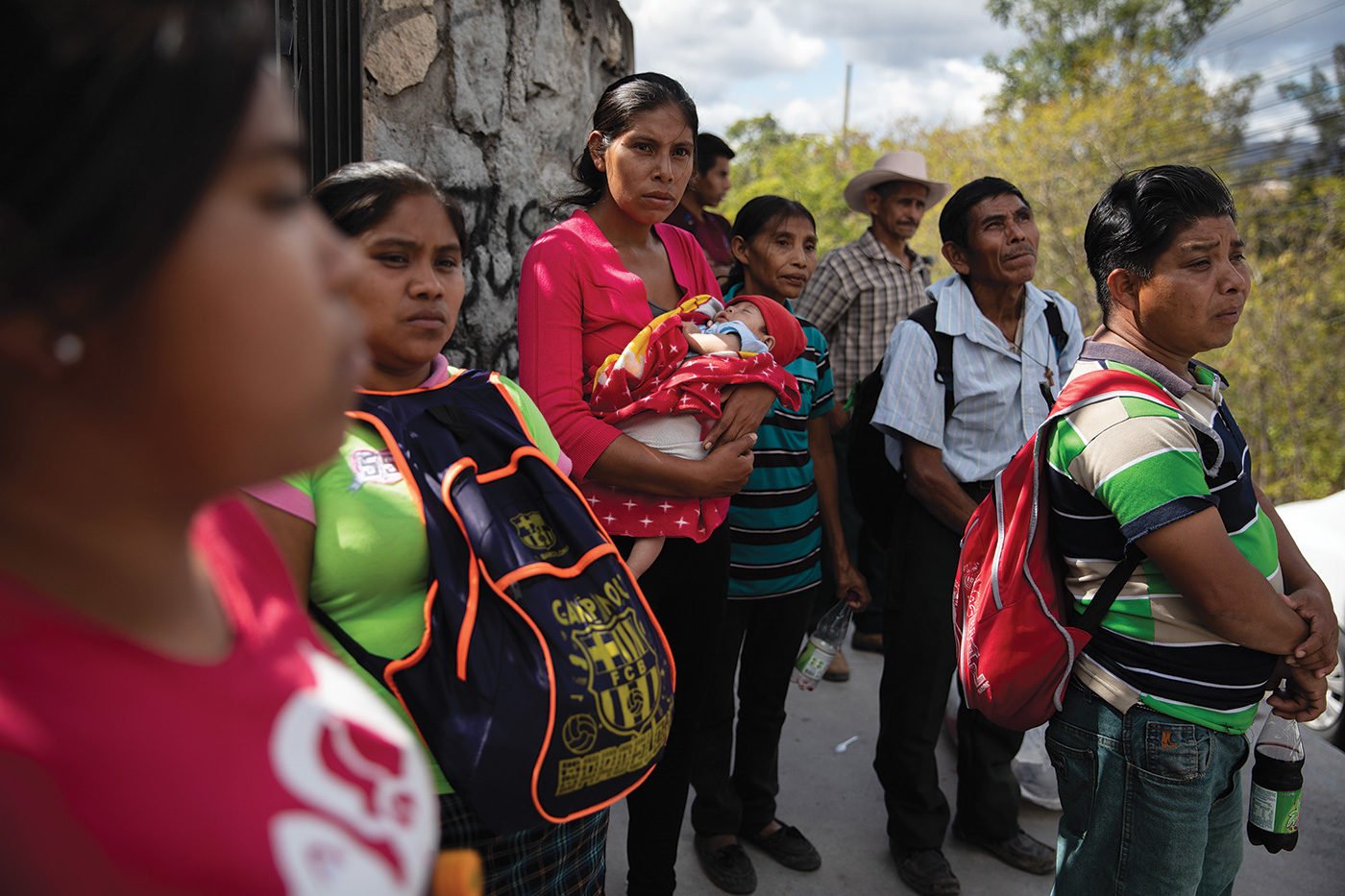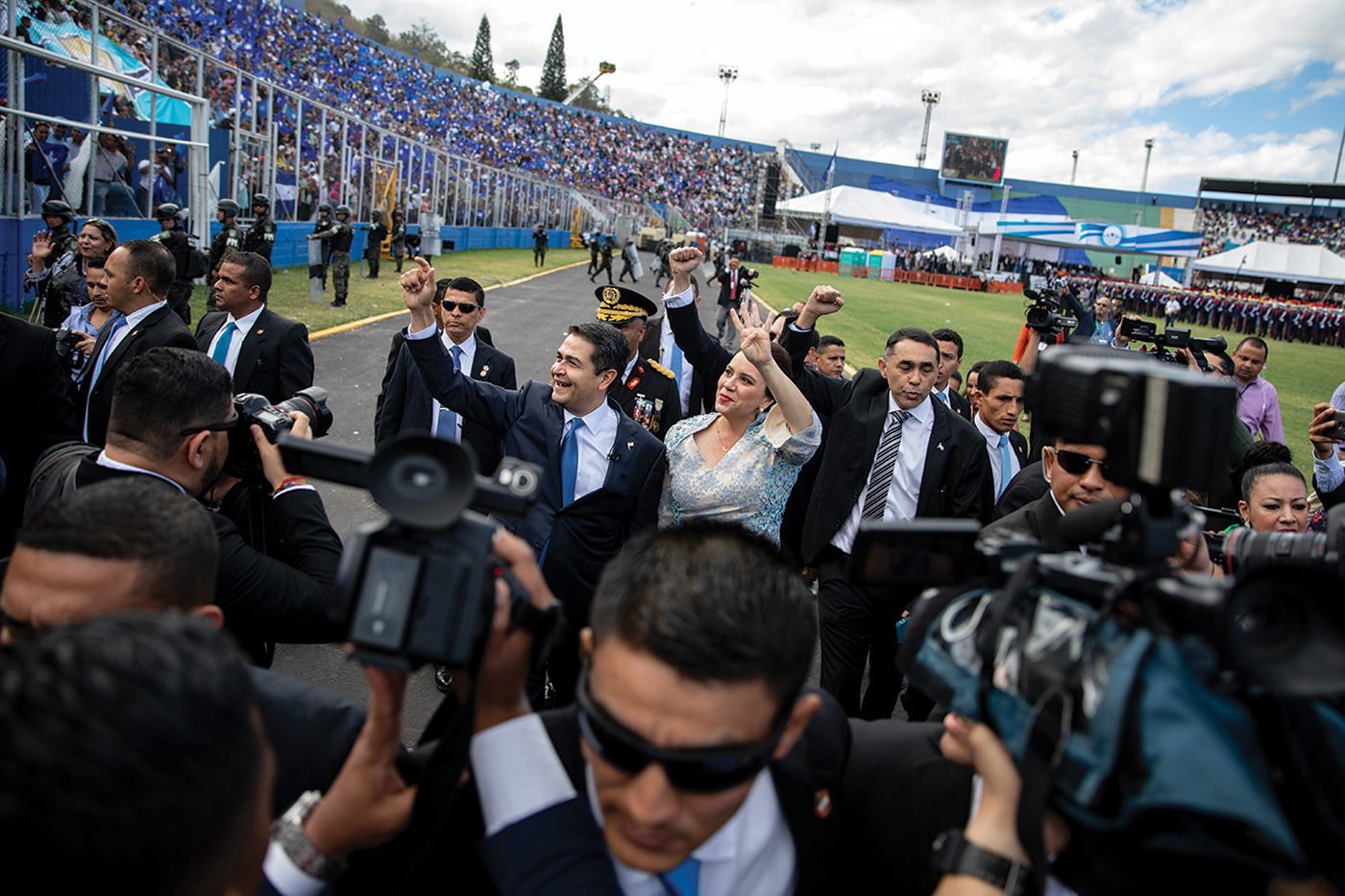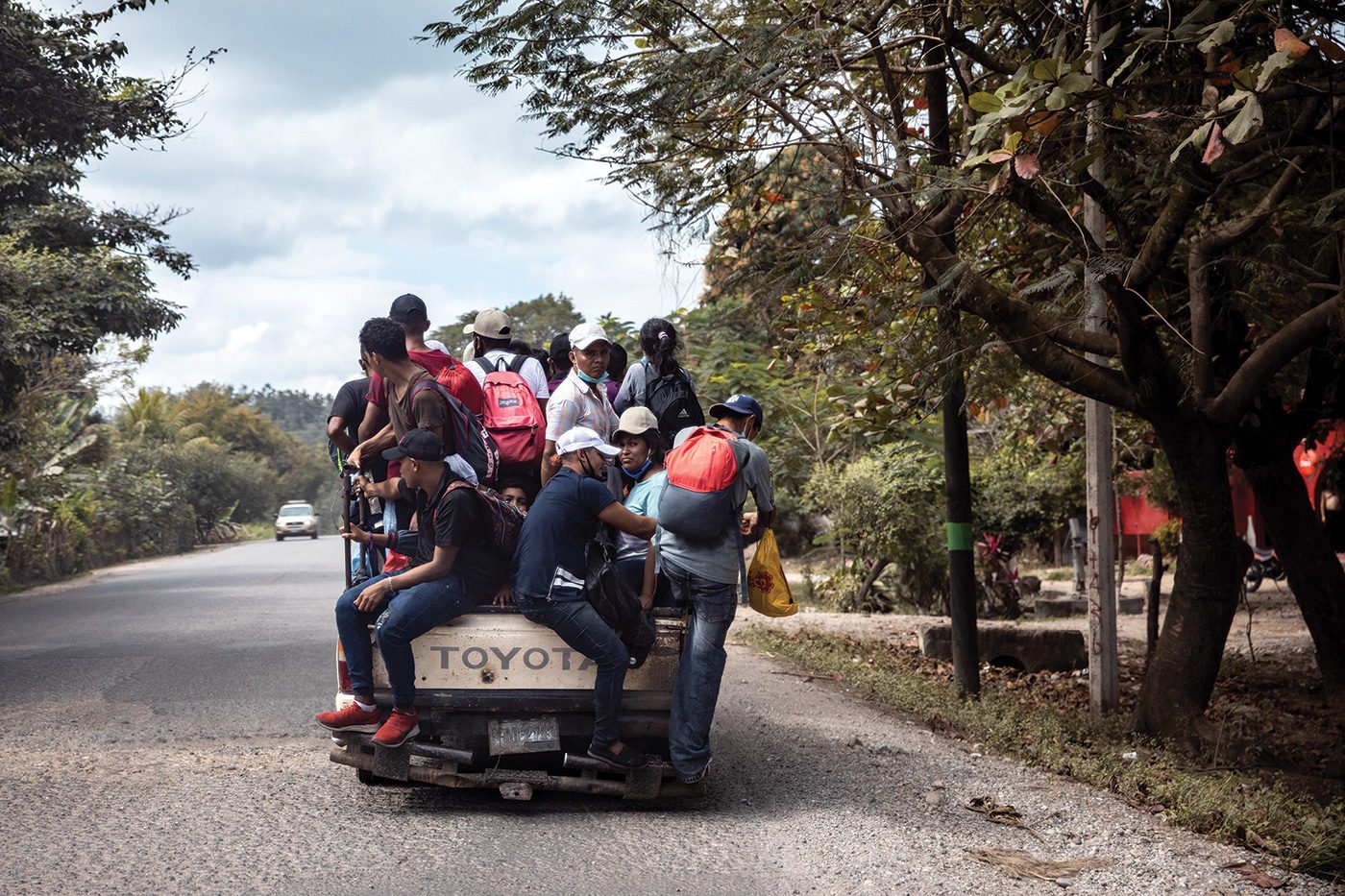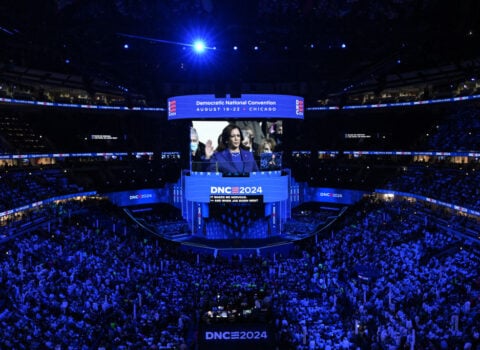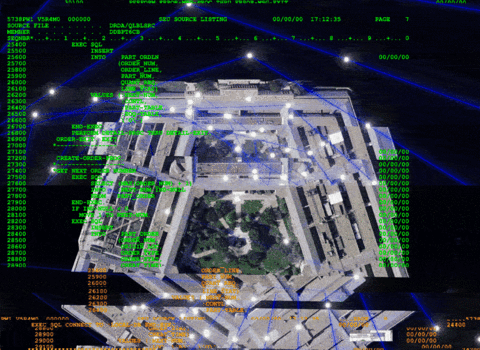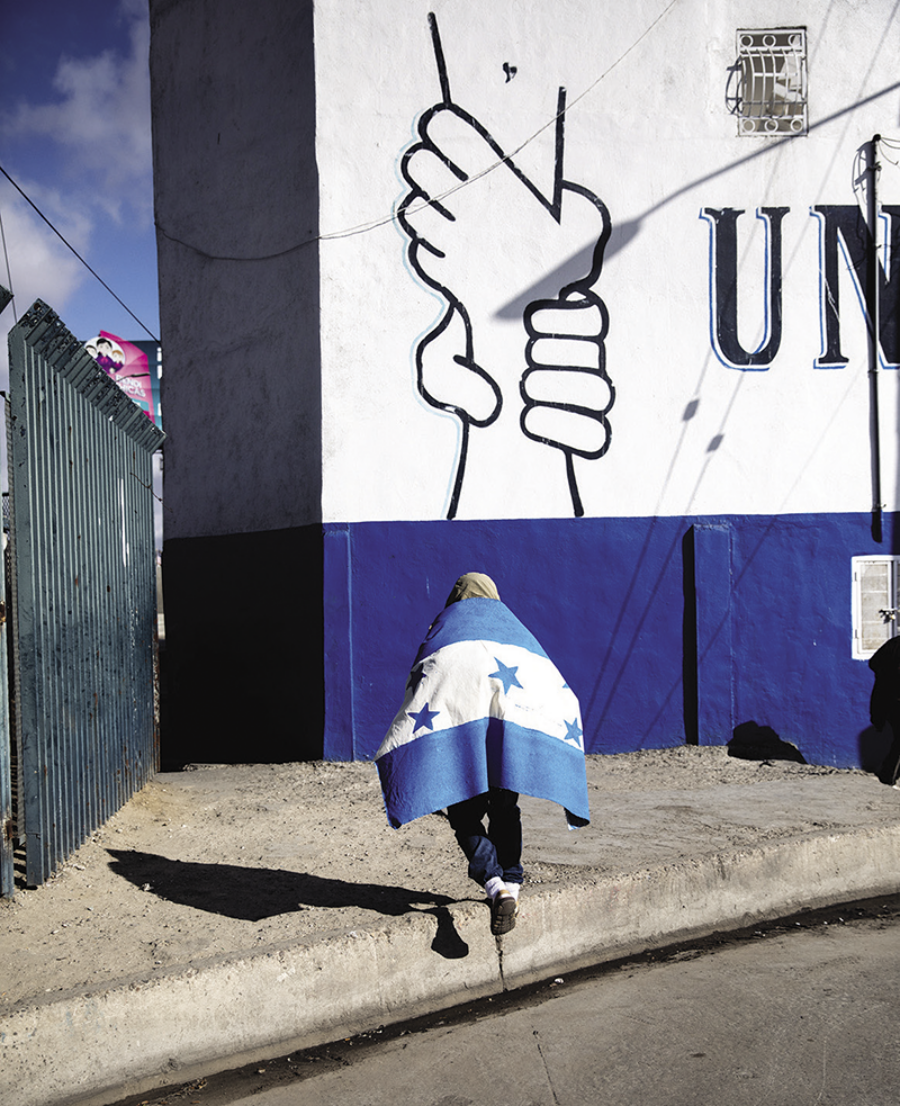
A migrant draped in a hand-painted Honduran flag in Tijuana, Mexico, December 2018 (detail). All photographs by Tomás Ayuso © The artist
This January, thousands of Hondurans gathered in the city of San Pedro Sula and began walking toward the Guatemalan border, the first barrier in their journey north to the United States. They were a long way off, but our frontier defenders were already on full alert. “Do not waste your time and money, and do not risk your safety and health,” the acting head of U.S. Customs and Border Protection had announced a week earlier. “Migrant caravan groups will not be allowed to make their way north in violation of the sovereignty, standing public-health orders, and immigration laws of the respective nations throughout the region.” The presumptive secretary of state, Antony Blinken, echoed the sentiment, saying simply: “Do not come.” Soon after the migrants crossed into Guatemala, that message was reinforced with the clubs and tear gas of the U.S.-financed Guatemalan police, forcing the crowds back into the country they had fled.
The men, women, and children in the caravan had hardly been risking their own “safety and health” by setting out on the hazardous journey, precisely because they had so little of either to begin with. Even before two back-to-back hurricanes tore a path of destruction across the country last November, the population was in desperate straits. Sixty percent lived in extreme poverty, almost 40 percent were unemployed, and predatory corruption by the ruling elite reigned supreme. The pandemic had added its own agonies—not only did COVID-19 sicken hundreds of thousands of people, but government insiders stole almost the entire budget intended for emergency medical treatment, and the police and military imposed a near-total countrywide lockdown, arresting thousands for curfew violations.
For the people making this exodus, braving the perils of the journey was evidently a safer bet than staying put. For example, a young man who would give only his first name, Francisco, told the journalist Sandra Cuffe that the hurricanes had put an end to his $8-a-day bricklaying job and that a mining company was ravaging the area where he lived, hiring thugs (often connected to the military) to terrorize him and other locals opposed to the environmental devastation. Elsewhere in the crowd, a twenty-eight-year-old mother named Olga Ramírez carried the youngest of her four children in her arms while two of the others rode in a decrepit stroller pushed by her husband. She tearfully explained to a reporter that they had lost their precarious living selling food in the municipal bus terminal in Danlí, a provincial town east of the capital, Tegucigalpa, after the local mayor privatized the terminal and summarily ejected Ramírez and her fellow vendors. “They threw us out like we were dogs, like garbage, as if we were worthless,” she said as she trudged along.
“I think the whole country would leave if they could,” Jean Stokan, a justice coordinator for the Catholic group Sisters of Mercy of the Americas, told me. Stokan has spent decades witnessing the plight of Central Americans. “Honduras today is like El Salvador in the Eighties, death squads and all,” she said, recalling the bloody U.S.-supported counterinsurgency. She talked of corrupt police officers enjoying impunity; community leaders, human rights activists, and labor organizers being threatened, abducted, and jailed; and a wave of femicides—“women’s bodies chopped up and discarded in plastic garbage bags.” It thus came as no surprise to Stokan that Hondurans were fleeing their country by the tens of thousands. “You know the phrase ‘a person doesn’t leave their home unless it is in the mouth of a shark?’ ” she asked. “That’s Honduras.”
In recent years, Washington has expressed its fair share of laments over the little country’s desperate condition, and has poured a lot of money into projects aimed at eliminating the so-called push factors driving people to flee. USAID spent $90 million in 2020 alone promoting “good governance,” fostering “competitive, resilient, and inclusive market systems,” and creating “economic opportunities that incorporate women.”
Our partner in these worthy efforts has been Juan Orlando Hernández, often referred to as JOH, the stocky, frequently charming president of Honduras. Since he took office in 2014, Washington has relied on Hernández to implement American-devised programs for alleviating his country’s ills: unemployment, violence, corruption, and most importantly, the cocaine trade. But despite insistent protests locally and abroad that Hernández oversees a repressive and corrupt regime, the United States has continued to treat him as an indispensable partner.
Any lingering pretense that Hernández has been on America’s side in the drug war, however, was ripped away this January by federal prosecutors in New York. The occasion was a filing in the case of a major Honduran drug trafficker, Geovanny Fuentes Ramírez, who was arrested at Miami International Airport last year while trying to flee the country. Fuentes Ramírez’s crimes, as alleged in the motion, included cocaine smuggling, bribery, and murder. According to court documents, Fuentes Ramírez had worked with a number of CCs, or co-conspirators—in particular, one referred to as CC-4. In the filing, the prosecutors included the report of an informant who had much to say about Fuentes Ramírez’s dealings with this obviously powerful co-conspirator:
In approximately 2013 and 2014, CC-4 promised to protect the defendant from arrest and extradition; promised to help the defendant transport cocaine with the assistance of Honduras’s armed forces; said he wanted to use the defendant’s laboratory because of its proximity to a key shipping port; directed the defendant to work with Tony Hernández (CC-4’s brother) with respect to drug-trafficking activities; and stated that he was going to “shove the drugs right up the noses of the gringos.”
The reference to CC-4’s brother made it absolutely clear who the prosecutors were talking about: the president.
Prosecutors made the accusation explicit at Fuentes Ramírez’s trial in March, but in Honduras there was never any doubt about the co-conspirator’s identity. Protesters, including many who had been part of the caravan, flourished signs reading cc-4 = joh. Among those who knew the truth was Bertha Oliva, a Nobel Prize–nominated activist who has been fighting for human rights in Honduras since her husband was disappeared by a military death squad in 1981. When I asked her whether she was surprised by the prosecutors’ revelations, she made clear that she has no patience for those who claim prior ignorance of Hernández’s criminal behavior. “Let’s leave the surprises to children, to those who have no memory, or who can’t think clearly,” she answered.
The suggestion that Hernández might be associated with the narcotics trade was not new in the United States, either. His brother Tony had already been tried and convicted as a major trafficker in New York in 2019. Testimony in his trial was replete with references to the Honduran leader. Still, the president’s crude gangster talk about shoving drugs up people’s noses was a slap in the face to all the high-level U.S. officials who had professed esteem for him over the years.
Joe Biden, for instance, recalls the warm relationships he built as vice president with certain Central American leaders in his book Promise Me, Dad, citing Hernández as one of his “friends,” and a “confidant.” General John Kelly, who commanded Southcom—the Pentagon’s Central and South American division—from 2012 to 2016, was another powerful supporter (he would later become Donald Trump’s chief of staff). Concluding a visit to Tegucigalpa in June 2014, the four-star general commended the “incredible and impressive” fight against drug trafficking and organized crime being waged by Hernández and his government. The following year, he declared to Congress that the Honduran government was “working hard to combat the drug trade . . . and take meaningful action to protect human rights.” In 2018, the Florida senator Marco Rubio tweeted,
Met with President @JuanOrlandoH and Foreign Minister Lara of #Honduras to thank them for their support of #Israel and U.S. at the @UN and his partnership targeting drug traffickers.
Year in, year out, it seemed that no official U.S. encounter with the Honduran narco boss was complete without a tribute to his prowess as an anti-drug crusader.
The United States has long been involved in Honduras, from its days as an effective colony of the United Fruit Company, down through the era when it served as a base for America’s illegal war in Nicaragua. That was in the Eighties, when Battalion 3-16, a Honduran death squad, kidnapped, tortured, and murdered at will with the protection of the U.S. Embassy. Many say things are even worse now. “The situation has been deteriorating for forty years,” the émigré scientist Salvador Moncada told me. One of the world’s preeminent medical researchers, knighted by Queen Elizabeth in 2010, he described his anguish over his country’s descent: “There’s a total state of corruption. Now it is almost a failed state, and the United States is not innocent!”
If Washington could ever claim innocence, that right was surely lost in the summer of 2009, when members of the Honduran military hauled the democratically elected president, Manuel Zelaya, out of the presidential palace at five-thirty in the morning, bundled him onto a military plane, and flew him out of the country. Along the way, they stopped at the joint U.S.-Honduran military base at Soto Cano to change planes, then deposited Zelaya on a Costa Rican runway, still in his pajamas. U.S. officials were careful to avoid publicly labeling it a military coup. (Hugo Llorens, the U.S. ambassador at the time, unequivocally called Zelaya’s removal an “illegal coup” in a classified cable released later by WikiLeaks.)
The plotters’ threadbare excuse was Zelaya’s support for a constitutional amendment that would allow a president to run for a second term, even though he was not planning on running again. Though a scion of the local oligarchy that had traditionally held power, Zelaya had made powerful enemies at home by enacting a series of modest social-democratic reforms.
Perhaps more importantly, he had received warnings from Washington regarding his affable relationship with its bête noire, Venezuela’s leftist president, Hugo Chávez. Later, a detailed investigation by Jake Johnston for The Intercept revealed that U.S. military officers operating out of the Center for Hemispheric Defense Studies, in concert with both senior State Department officials and powerful Republican senators such as Jim DeMint of South Carolina, were deeply involved in facilitating widespread acceptance of the takeover in Washington. The United States maneuvered to block efforts to reinstate Zelaya until subsequent elections could bestow a veneer of legitimacy on the coup. Hillary Clinton, who was then serving as secretary of state, wrote in her 2014 memoir Hard Choices that her strategy was to get Honduras to hold elections quickly, “which would render the question of Zelaya moot”—an imprudent admission that she deleted from the paperback edition.
The November 2009 elections, closely controlled by the army and largely boycotted by Zelaya’s supporters, took place in a climate of intimidation and violence. Crowds protesting the coup were met with tear gas and clubs. One leftist presidential candidate was forced to withdraw after being severely beaten by the police. Nevertheless, the U.S. government quickly moved to recognize Porfirio “Pepe” Lobo of the National Party as the victor. The State Department praised the Honduran people for “peacefully exercising their democratic rights to select their leaders.”
Shortly after Lobo’s purported victory, the Honduran Congress also chose a new leader for itself: Juan Orlando Hernández. A graduate of SUNY Albany, Hernández was first elected to the National Congress in 2001, when he was thirty-two. Early on, he displayed a willingness to work with the United States, allowing U.S. officials the use of his office in 2003 to lobby for support for the Iraq invasion. After he became president of the Congress in 2010, he engineered the dismissal of four Supreme Court justices, a move that gave him effective control of the government, including the police and the military. In her book The Long Honduran Night, the historian Dana Frank quotes a local oligarch observing that in fifty years of Honduran politics he’d “never known a more Machiavellian, dangerous figure than Juan Orlando Hernández.”
By 2013, he was ready to move on to the top office, running for president as the National Party’s candidate after Lobo obligingly stepped aside. It would not be a walkover—the coup and the militarized repression that followed had inspired a surge of opposition. But Hernández could draw on many sources of support, including security forces flush with American aid money (which had soared since the coup) and plundered public funds. Amid a welter of fraud and intimidation reported by international observers, Hernández claimed 36 percent of the vote while his leading opponent—Zelaya’s wife—drew 27 percent. Again, State Department officials congratulated the Honduran government for “ensuring that the election process was generally transparent, peaceful, and reflected the will of the Honduran people.”
Hernández had run on a law-and-order platform, promising to crack down on escalating gang violence with a mano dura by putting “a soldier on every corner.” The bedrock of his support, however, was among bigger, more violent gangsters, chief among them his brother Tony. Already a rising narco power in western Honduras, Tony proudly stamped his bales of cocaine with th, a trademark inspired by the Tommy Hilfiger logo. By the time he was arrested, he had moved two hundred tons of cocaine into the United States. As early as 2010, according to court testimony, Tony confided to an associate that his brother would be the next National Party presidential candidate, yielding rich dividends for the TH brand if he won.
Others in the business also appreciated the possibilities of a Hernández presidency. According to assistant U.S. attorney Jason A. Richman’s opening statement at Tony’s trial, $1 million from “El Chapo” Guzmán, the infamous cartel leader, made its way to Hernández’s campaign. As a trafficker named Alexander Ardon (who admitted to fifty-six murders and “some torture”) would testify, the fearsome drug lord had packed the cash in plastic bags, which Ardon handed to Tony himself. “We counted it in the car.”
Once in power, Hernández actively liaised with his brother and other associates on matters necessary to the smooth function of business, such as securing police and military protection for cocaine shipments, while simultaneously earning plaudits in Washington by extraditing traffickers he deemed expendable for trial and conviction in the United States. It is unclear whether he knew, or cared, that not everyone in the U.S. government took his crime-fighting credentials at face value. In 2013, the Drug Enforcement Administration opened an investigation into the Hernández family. Five years later, Tony was arrested on multiple cocaine-trafficking charges after agreeing to meet with agents in Miami. (His misplaced confidence may have been due to the fact that he had coolly talked his way out of trouble in an earlier meeting.)
The investigation presumably had high-level approval, at least within the Justice Department, which has a representative on the DEA’s Sensitive Activity Review Committee, the body that evaluates politically thorny cases. The State Department, however, does not have a seat on the committee, which may explain the answer I got from a DEA agent when I asked whether anyone had objected to the Hernández investigation. “Only the State Department,” he replied with a laugh. When I queried James Nealon, who served as U.S. ambassador to Honduras from 2014 to 2017, about whether he had known that U.S. law enforcement had the president of Honduras in its sights, he chose his words carefully. “During my time as ambassador to Honduras,” he said, “I was never informed by DEA or the Department of Justice that they were investigating President Hernández, and I asked repeatedly.”
As the DEA investigation edged closer to the Casa Presidencial, conditions in Honduras were steadily deteriorating. With Washington’s hearty approval, international financial organizations had begun enforcing free-market orthodoxy. In 2014, the International Monetary Fund agreed to provide Honduras with a three-year, $189 million loan, and in return demanded the privatization of key economic sectors such as the phone and electric companies. At a time when the unemployment rate was already over 50 percent, the IMF agreement alone cost ten thousand workers their jobs within two months. The privatization of the Danlí bus terminal that destroyed Olga Ramírez’s livelihood and led her to try to flee the country was the fruit of a public-private partnership promoted and funded by the World Bank. Ramírez and her fellow stallholders could not afford the higher rent demanded for space in the refurbished building, which thus remained empty.
Along with this job squeeze and tax hikes that fell disproportionately on the poor came injunctions to open the country to foreign investment. At its most extreme, this has taken the form of Zones for Economic Development and Employment. Apparently inspired by the crackpot doctrines of Ayn Rand and her free-market disciples, ZEDEs are corporate-owned enclaves that operate outside Honduran sovereignty, free to make their own laws and set their own taxes. Hernández liked the idea so much that he made sure his overhauled Supreme Court nullified a previous decision and legalized the zones. The first such libertarian paradise, a tourist development featuring homes for wealthy foreigners on the Honduran island of Roatán, is currently under construction. The presiding authority, Próspera, a Washington-based corporation, will control everything down to who is allowed to live there.
Elsewhere, U.S. companies stepped in to take advantage of relaxed investment laws, lower wages, and union repression. A 2016 BuzzFeed News investigation found that factory workers in a tax-free zone outside the city of Choloma were sewing shirts for meager wages in hundred-degree heat on a subcontract for a clothing line owned by Donald Trump. Foreign investors have also taken to exploiting the land itself. The iron-oxide mining operation that drove Francisco to join the January caravan was partly backed by Nucor, the largest U.S. steel manufacturer. Huge areas of countryside farmed by small cooperatives—consisting largely of indigenous peoples—were taken over by magnates (who were often narcos themselves) and turned into environmentally destructive palm-oil plantations.
Equally ruinous for Hondurans have been the ubiquitous hydroelectric projects, most notoriously the Agua Zarca dam on the Gualcarque River. The project became famous largely because of Berta Cáceres, the daughter of a local midwife who led the Lenca people in protests against the dam and was murdered in 2016. Thanks to her efforts, prospective international investors, including the World Bank, eventually backed out. But DESA, a power company led by former U.S.-trained military intelligence officers, pressed on. Two of the hit men who eventually broke into Cáceres’s home and killed her were former DESA employees. So many campaigners were murdered in struggles against land grabs that the nonprofit Global Witness labeled Honduras “the deadliest country in the world to be an environmental activist.”
The Cáceres murder sparked international outrage, particularly on Capitol Hill. The state of human rights in Honduras had already become an issue during the violent repression that followed the 2009 coup. Now the fury among prominent human rights defenders reached a crescendo. The Vermont senator Patrick Leahy told the State Department that he would block aid until the Honduran government fully investigated the killing. In the House, progressives put forward a petition calling for the United States to pressure the Honduran government to block the dam and protect activists. Soon after, Hank Johnson of Georgia introduced the Berta Cáceres Human Rights in Honduras Act, which called for the immediate suspension of all aid to the Honduran police and military pending effective reforms, including removing the military from domestic policing operations. The bill got a swift response, not only from a wide range of activist groups, but also from Hernández, who flew to Washington to lobby against it. He found an attentive audience among centrists, and Johnson’s bill never made it to the floor.
In 2017, Hernández ran for reelection. The constitution barred second presidential terms; Zelaya’s cautious initiative regarding a change had been used as the pretext for his overthrow. But Hernández’s handpicked Supreme Court, in a decision green-lit by the United States, simply repealed the rule, deeming it a “human rights” issue. With control of the electoral machinery and campaign coffers flush with cocaine cash, Hernández’s prospects looked promising.
The opposition, meanwhile, had united behind Salvador Nasralla, a popular TV personality. On election night, with 57 percent of the votes counted, Nasralla was several points ahead, whereupon the count was abruptly halted. After it resumed, Hernández emerged as the victor by a narrow margin. Furious Hondurans took to the streets, and the military police responded with rifle fire, killing twenty-two people. But the most important reaction to the almost certainly fraudulent result came from Washington, where a senior State Department official told reporters that they had “not seen anything that alters the final result.”
Now insulated against domestic challengers, Hernández gambled on the idea that Washington would continue to accept his fraudulent battle against corruption and the drug trade, thereby ensuring that U.S. aid to the police and military continued to flow. (The total amount is artfully concealed in Pentagon accounting.) Given previous U.S. support, it was a reasonable bet. Progressives in Congress still pressed for an aid cutoff, but centrists in both parties maintained their resistance. Hernández was even invited by the California representative Norma Torres to defend his record before members of Congress. The president’s connections in the drug trade, however, were becoming harder to ignore. In January 2015, two brothers leading the rich and powerful Cachiros, a rival trafficking clan, made a deal with the DEA, turned themselves in, and offered chapter and verse on the trafficking activities of the Hernández brothers and their inner circle, leading eventually to Tony’s arrest.
Not even the scandalous revelations from Tony’s trial, however, have been enough to undo the two countries’ special relationship. Two days before Tony’s verdict, a tweet from the U.S. Embassy in Honduras affirmed that “our governments cooperate on a wide range of issues including migration, security, the fight against narcotics, and economic development.” Hernández’s official Twitter account featured a photo of himself in jocular conversation at a military parade with the U.S. chargé d’affaires, Colleen Hoey. A State Department official even declared Hernández “a reliable partner.” Within weeks of the trial’s revelations, the U.S. military made it clear that nothing had fundamentally changed: Admiral Craig Faller, the commander of Southcom, flew to Tegucigalpa to present the country’s top general, René Ponce Fonseca, who would feature in Fuentes Ramírez’s trial as CC-13, with the Legion of Merit for his work on “the capability to interdict illicit flows.”
As the caravan retreated from Guatemala this January, the newly sworn-in Joe Biden promised $4 billion in aid to Central America. Expressing commendable sentiments about immigrants with “little more than the clothes on their backs and hope in their hearts,” Biden signed an executive order repealing many of Trump’s more baleful antimigrant measures. He also called for a Root Causes Strategy that would discern and address the incentives leading to migration and proposed an international anticorruption commission that would aid Central American prosecutors in pursuing crooked officials.
This was familiar territory for Biden. As vice president, he had encouraged the creation of the Organization of American States’s Mission to Support the Fight Against Corruption and Impunity in Honduras (MACCIH). More importantly, Biden had fostered the Alliance for Prosperity in the Northern Triangle (official parlance for Honduras, El Salvador, and Guatemala that neatly excludes migrant-free Nicaragua). The program, which launched in 2014 as border crossings exploded into a political crisis for the Obama Administration, was funded by the United States to the tune of at least $750 million. It was billed as a way to foster economic development and the rule of law, empower women, hire police officers and teachers, and crack down on narcotics cartels, among other worthy commitments.
In his 2020 campaign, Biden touted the Alliance for Prosperity as a triumphant success, recounting how the “strategy [had] engaged the leaders of the region to take responsibility for improving economic prosperity through poverty reduction and regional integration programs, deepened security cooperation to reduce gang violence and combat transnational criminal organizations,” and promised that he would follow a similar path as president. This was well received in the region by, among others, Hernández, who congratulated Biden on his inauguration: “We acknowledge your commitment with the Alliance for Prosperity and welcome your renewed support for the region.” Alluding to the disastrous effects of the hurricanes and the pandemic, he added, “We can address this and other challenges effectively working together as we did in the past; for example our fight against drug dealing.”
Hernández’s enthusiasm was unsurprising, given that Biden’s previous efforts had not changed much in Honduras. Desperate migrants continued to journey north—the total increased by 171 percent the year that the Alliance for Prosperity was launched—and MACCIH steered clear of anyone in or close to the Hernández regime. (After Trump abandoned even a rhetorical interest in fighting corruption, MACCIH was shut down in 2020.)
Juan Gonzalez, Biden’s senior adviser on Latin America, declared sternly in a January interview with a Salvadoran paper that “a leader who won’t attack corruption won’t be a U.S. ally.” In that case, Hernández is surely disqualified. But in Honduras, people are getting impatient. The day before Gonzalez’s remarks were published, forty human rights organizations signed a letter to Biden denouncing the support Hernández had received from the Obama and Trump Administrations and “respectfully demanding the suspension of all military aid to Honduras.” One of the principal authors was Oliva, the activist. I asked her whether a suspension of aid would stop people from fleeing the country. “People have left in caravans toward the land of those who created the problem and sustained it,” she answered. “They left because they had lost hope that things would change and because many smelled death approaching. They ran out of time to wait for Washington to sort out the mess it created down here.” If Hondurans were allowed to dismantle that regime without interference, she said, “of course it would make a difference.”
Honduran human rights organizations may have little sway in Washington, but U.S. senators from the majority party are a different matter. The Honduras Human Rights and Anti-Corruption Act, introduced on February 24 by the Oregon senator Jeff Merkley, demands that the United States designate Hernández as a narcotics trafficker, cut off all aid and arms sales to the Honduran military and police, and cooperate with the United Nations in monitoring human rights.
Merkley considers the security aid cutoff essential. “If we don’t apply such pressure, then we’re just facilitating and strengthening the force that is part of the problem,” he told me the day after introducing the bill. “If we’re going to be partners with them, to be part of the solution, they have to be a very different force.” I asked whether Hernández, who had already responded to the bill by threatening to stop cooperating on antitrafficking efforts, was beyond redemption. “Just the fact that he would say ‘I’ll give the drug traffickers free rein if you try to have my security forces be part of the solution,’ ” Merkley replied, “tells you a lot about the type of person we’re dealing with.” I took that as a yes.
Despite the unwelcome attention, Hernández may be hoping that the United States will let him serve out the remaining year of his term in peace, or even run again. He would do well, however, to reflect on the fate of Manuel Noriega, Panama’s dictator in the Eighties. Heavily involved in the drug trade, Noriega was a cherished U.S. partner until the day the military picked him up and consigned him to a prison cell for the rest of his life. I asked Colonel Keith Nightingale, a Special Forces veteran who participated in the strongman’s capture, what had prompted Noriega’s old friends to turn against him. “He had,” Nightingale said, “become too obvious.”

